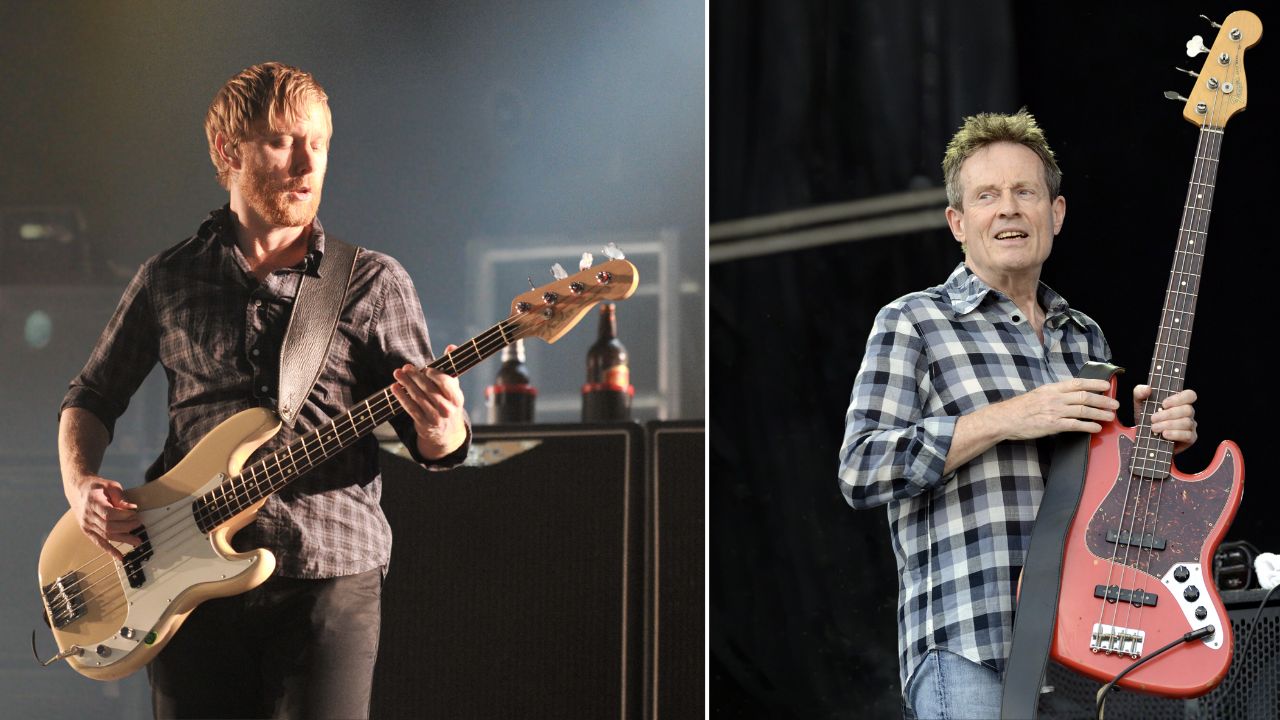
If you're familiar with the Foo Fighters’ big hits – Monkey Wrench, Learn To Fly, Times Like These, Breakout and so on – you'll know that they specialise in Rock with a capital R, designed for stadiums and beloved of crowds worldwide.
It's all a long way from bassist Nate Mendel's youth as a punk kid from Richland, Washington. “I just wanted to be in a band," he told Bass Player. “I was listening to the Ghost In The Machine album by the Police at the time, and I was hugely into Sting, so when my friend suggested I should play bass guitar I thought it sounded like an awesome idea.”
It certainly was – so what was that first bass? "I got a Steinberger copy by Cort, because it was the ’80s, and that was what you did when you were 13 back then! I got a practice amp and we messed around a bit, but that band didn't last long.
“After that I got into punk rock and moved on to an Ibanez Roadstar and a black Kramer, a kind of Travis Bean-style bass. I joined this band called Christ On A Crutch and I bought a P-Bass for $200 from the singer. That's the one I modelled my signature Precision on.”
So who's bigger than the Foo Fighters, in terms of numbers of gigs played at truly huge venues? No-one in rock apart from U2 and Guns N’ Roses. But there was a time when not everything that Dave Grohl touched turned to gold.
Back in 2004, Grohl admitted to not being happy with the band's One by One album, with the group taking some time out before heading back in to record the electric and acoustic double-disc, In Your Honour, which also included such guest performers as Queens of the Stone Age frontman Josh Homme and Led Zeppelin bassist John Paul Jones.
“It was Dave's idea to bring John Paul Jones in, and initially I was like, ‘Okay, so how many songs am I not going to play bass on?’ It was intimidating! – although he did everything in his power to make it not so. But when he was tuning up his Mellotron he played a couple of Zeppelin riffs, so that was great. ”
Jones played mandolin on Another Round, and piano on Miracle. “He is more than just a bass player,” said Grohl. “He's an arranger. He came in, listened to the song, put it on piano, played it a few times and it was done.”
“On the first disc we did things in segments,” said Mendel. “First drums, then scratch guitars, I'd take home a Pro Tools file and write a bassline. I would run it by Dave and the producer, we'd talk about it, make changes, and then put it down. I would usually come in with this elaborate bassline – but over time, I've come to appreciate simplicity and what it can do for a song.”
“When it came time to do the acoustic record, we were running low on time and I didn't have a chance to go and write basslines, so they ended up being much simpler.
“A couple of times, I hadn't even heard the song before – Dave and Chris would put down their guitar lines and I'd be in a room with the bass, and our producer Nick Raskulinecz would go, ‘Okay, let's run it a couple of times and see what happens.’ I was concentrating on just finding the notes and getting the rhythm right.”
As is usually the case when big bands on a big budget go into big studios, there was an enviable choice of gear for Mendel to choose from, including his custom shop P-Basses. “They were made for me in the late ’90s: they're basically what my signature bass turned into.”
“It's a pretty typical P-Bass, but I had different pickups put in, and a thicker bridge. The main thing was trying to get the shape of the neck right. In the batch of 1971 basses that mine came from, I think that they were trying to split the difference between the feel of a Precision neck and a Jazz neck. It's a little wider than a Jazz neck, which for me feels a little crowded.”
Has Mendel ever gone down into five-string territory? “No! In our little camp, five-strings are pretty illegal. It's funny, because I totally understand the value of that fifth string, but it's just one of those lines that you don't cross.”







